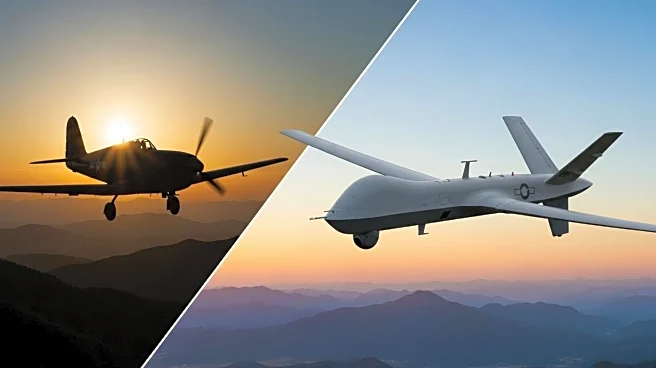What's Happening?
The U.S. Air Force has reactivated the 431st Expeditionary Reconnaissance Squadron, a World War II-era unit, at Kunsan Air Base in South Korea. This squadron, now equipped with MQ-9 Reaper drones, will serve as a surveillance and intelligence force to enhance security for South Korean allies. The MQ-9 Reaper is a highly maneuverable drone capable of 24-hour missions and precision strikes with munitions such as AGM-114 Hellfire missiles. The reactivation of this squadron is part of a broader strategy to bolster the Seventh Air Force's support to South Korean defense forces, following the recent transfer of F-16 Fighting Falcon warplanes to Osan Air Base near the North Korean border.
Why It's Important?
The reactivation of the 431st Squadron as an MQ-9 Reaper drone unit underscores the U.S. commitment to maintaining security and stability in the Indo-Pacific region. This move is significant in the context of rising tensions on the Korean Peninsula and the strategic importance of the region. The deployment of advanced drone technology enhances the U.S. military's surveillance and rapid response capabilities, which are crucial for deterring potential threats from North Korea. Additionally, this development strengthens the U.S.-South Korea alliance, demonstrating a shared commitment to regional security and defense cooperation.
What's Next?
The newly reactivated squadron will conduct surveillance missions across the Pacific and be prepared to respond to emerging threats. The U.S. Air Force's focus on rapid deployment and technological advancement in drone capabilities is expected to continue, aligning with the Pentagon's initiative to quickly acquire and field drones. This strategic positioning may prompt reactions from regional stakeholders, including North Korea, which could influence future diplomatic and military engagements in the area.
Beyond the Headlines
The reactivation of the 431st Squadron reflects broader trends in military strategy, emphasizing the integration of advanced technology and unmanned systems in modern warfare. This shift highlights the evolving nature of military alliances and the importance of technological superiority in maintaining geopolitical stability. The use of drones for surveillance and precision strikes also raises ethical and legal considerations regarding their deployment in conflict zones.









